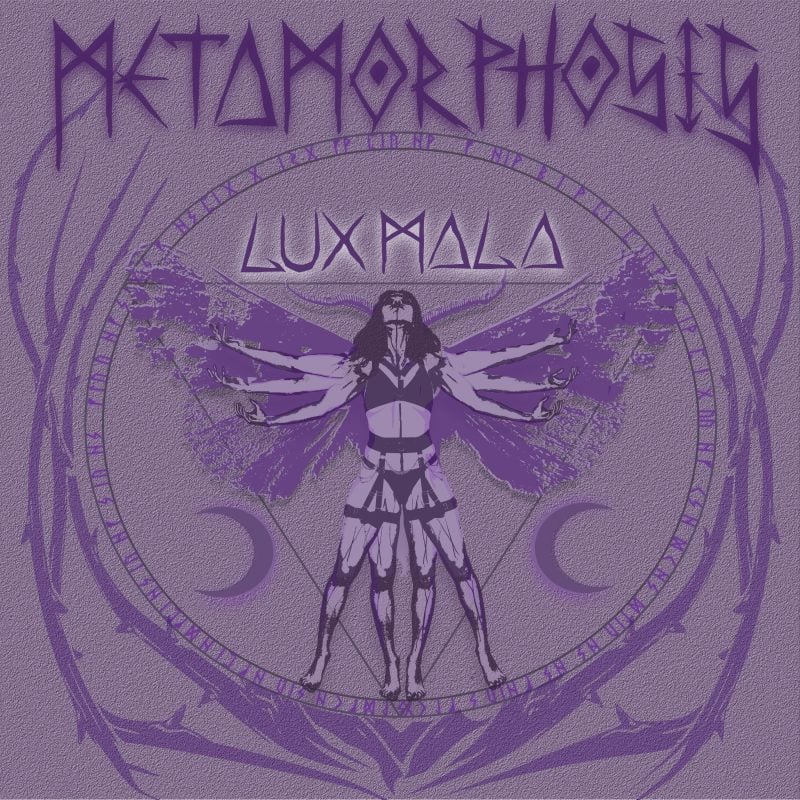In a time awash with disenchantment—where innocence and compassion falter in the noise—Nathalie Astrada’s voice as Lux Mala rings out clearly. She offers no easy optimism; instead, her raw honesty brings a stirring realism, intertwining fierce individualism with the notion of pain as paradoxically liberating. Drawing on the Argentine myth of a spectral light haunting fields and forests, Lux Mala highlights beauty within darkness.
From her home in Málaga, Spain, Astrada forges her music, visuals, and videos singlehandedly, uniting steadfast resilience with a bleak yet compelling aesthetic. Her art thrives on paradox—rebellion feeding strength—inviting listeners into reflective realms where solemnity and grandeur coalesce. Influences from Sopor Aeternus, Clan of Xymox, Fad Gadget, and PJ Harvey guide her sound across a vast terrain of delicacy to dissonance, tenderness to tempest. In an age of disillusionment, where the remnants of purity and kindness fight for space, Astrada’s reflections mirror a world grappling with its own contradictions, providing a stage where the somber and the sublime converge.
Now, Lux Mala heralds Metamorphosis, their second album, forged in two years of shifting emotions and restless experimentation since their self-titled debut in 2022. Each track breathes its own identity, leaping between tones and textures, yet bound by a shared reckoning with change. Pain and perseverance collide with chaos and clarity, chronicling the struggle to shed fear and embrace growth. The album pulses with the raw energy of transformation, a testament to the inevitable turmoil that shapes us into something stronger, something more. Lux Mala challenges listeners to confront discomfort, accept evolution, and step boldly into the unknown.
Deadly Nightshade, named for the infamous belladonna, sets the tone with an eerie instrumental—a ghostly prelude steeped in foreboding. Violins wail, synthesizers shimmer, bass growls, and the drum box ticks like a time bomb, a sinister symphony evoking Tuxedomoon and Angelo Badalamenti. Its haunting resonance flows into Apocalypse, a stark reflection on humanity’s self-inflicted ruin. Wars rage, greed devours, and the environment’s collapse spells collective doom. Deserts of dust and seas of despair stretch endlessly as stars fade and survival hangs by a thread. Featuring Tim Wenske, it summons echoes of Zola Jesus and Suzi Sabotage in its chilling urgency.
Serpiente was inspired by a dream: “I dreamed of being in the skin of a woman accused of witchcraft during the time of the Inquisition, trapped in a dungeon with other innocent women, mistreated and about to be burned at the stake, for being unfairly judged by the Catholic Church,” confesses Astrada. “One of those women was a real witch and could turn into a snake, an animal demonized by the Church.” The track has a sinister bend to it, with its eerie vocals and crashing synth bass.
When I’m Lonely glimmers with a retro allure, a synthetic dreamscape where hidden desires stir and nostalgia clings like fading light at dusk. It aches with the longing to capture fleeting moments, as fragile and fleeting as a sunset’s glow. Beneath its shimmering Italo-disco synths and operatic flourishes, the song unpacks the trivial and the tender—abandoned makeup, a metaphor for discarded facades, and the raw intimacy that solitude unveils. Less sinister than its darkwave roots, it borrows whispers of Evanescence’s theatrical grandeur and Kate Bush’s ethereal drama, crafting a piece that feels both vulnerable and vibrantly alive.
Toxicidad thrums with defiance, a rallying cry for reclaiming peace in a world teeming with corrosive connections. It urges the strength to draw lines, guard the self, and resist the pull of negativity. The track’s eerie, swirling synths ripple with a cinematic flair, toeing the line between horror and camp. Beneath its haunting haze lies an irresistible beat, driving its message with a rhythm as sharp as its purpose—a sound both unsettling and undeniably danceable. It is an anthem for those who dare to step away from the chaos and move to the music of their own resilience.
The Spanish-language track Catacumba plunges headlong into a world bristling with electronics, where Astrada’s expansive vocals entwine with synth-heavy soundscapes. It opens with a stark, throbbing bassline, sparse yet potent, soon joined by relentless drum beats that drive the listener into a hypnotic, dangerous dance. The song unspools a sense of suffocating entrapment, where numbness and emptiness hold sway. Words are absent, emotions stifled, as the speaker drifts into an echo of existence—an intangible, ghostly memory suspended in a realm without feeling, regret, or relief. Repetition amplifies the sense of endlessness, portraying a limbo frozen in perpetual darkness, stripped of sensation, hope, and escape.
“Catacumba reflects my thoughts of what we will become once we are dead,’ says Astrada. “It’s a reminder to live now because there is nothing we can do once we are in catacomb-like husks of our former selves.”
Ambivalencia, a synth punk creation, springs from producer Nöwan (Adrián Deiros Cal) in Galicia, Spain, who joined forces with Lux Mala on lyrics. Astrada’s somber stanzas expose moments when brightness and murk coexist. “Chaos makes me feel alive,” she proclaims.
Me Tengo que Escapar references Stephen King’s Gerald’s Game. “I was inspired by reading his book and tried using key moments for minimalist, raw, hard lyrics,” Astrada explains. “The song has analogies about the need to escape a deadly situation by doing whatever it takes to survive.” Dead Man’s Lullaby features sax’s plaintive cry, conjuring tragic passion overshadowed by fantasy.”
“It’s the first time I’ve released a brand new song in Spanish, and I felt a great relief to be able to get those feelings out of me,” Astrada says. “This song is my way to making up with people that are not in my life anymore, people that I love but for some reason had to cut our ties, to see the light, feel better with my life, with myself, and to move forward…Although I like to wander around in the dark poetically, sometimes it is difficult to realize when a person you love is hurting you. Love blinds us. Love confuses us. Sometimes it is unconscious, sometimes it is not. That is why you should take care of yourself first, never let your guard down.”
Metamorphosis features Russian artist Elena Bataeva, who gave the song the magic touch with her cello. While different from the other songs on the album, with its shrieks, screams, and spoken word poetry, Astrada recognized its importance to the collection.
“Basically, the lyrics are a description of how I perceived the world when I was a teenager until now,’ she says. “It is even very visible from the genres I chose when I started choosing music, which have varied throughout all these years. Going through a complicated childhood, I grew up with fear, pain and helplessness due to the lack of justice, then I found in genres such as metal, hardcore or punk a relief to my existence and I was no longer afraid, but I had hatred, resentment and rage. I had to be on the defensive all the time. But for several years I have changed the distortions for synthesizers, violins and more refined sounds. I learned to accept the good and the bad in myself and in others, my resilience is inside and I no longer see myself as a victim. Since I started composing for Lux Mala my life has taken a turn where I enjoy my life more instead of suffering it. Accepting change, progress, grow and to be better, as much as it hurts, it’s a Metamorphosis.”
Listen to Metamorphosis below and order here.
Metamorphosis was mixed and mastered by Pablo Abatte (Chile). The stunning cover art, designed by Sweden’s Valle Gren, is a meticulous creation, with every detail—from the font to the Lux Mala logo—crafted by hand. Inspired by Leonardo Da Vinci’s The Vitruvian Man, the piece reimagines the iconic symmetry and strength in the form of a female body. It celebrates the acceptance of natural beauty—delicate yet resilient, strong enough to confront life’s challenges. The artwork challenges long-standing artistic norms, which historically prioritized male ideals, rendering women invisible, victimized, or weak. By rejecting the patriarchal focus of phrases like “mankind” or “human,” and the diminished roles of women in religion and science, this reinterpretation transcends outdated systems, presenting a female figure as the embodiment of strength and symmetry in its own right.
“I find moths more intersting than butterflies because they are nocturnal insects, they generate heat by vibrating their wings, so they can be active at night, are adaptable to a broader range of environments and plants, so they may also be found in forests and wetlands, in addition to open meadows and fields, like the myth about the “Luz Mala”. Moths are attracted to light sources. Scientists believe that moths use the moon and stars to navigate, and there are many theories and mysteries surrounding their attraction to flames, which is a fascinating behaviour that I can relate to a lot.”
Follow LUX MALA:
YouTube
Bandcamp
Soundcloud
Spotify
Facebook
Instagram
The post Vitruvian Woman — Argentinian Darkwave Artist Lux Mala Celebrates Feminine Resilience with “Metamorphosis” LP appeared first on Post-Punk.com.




